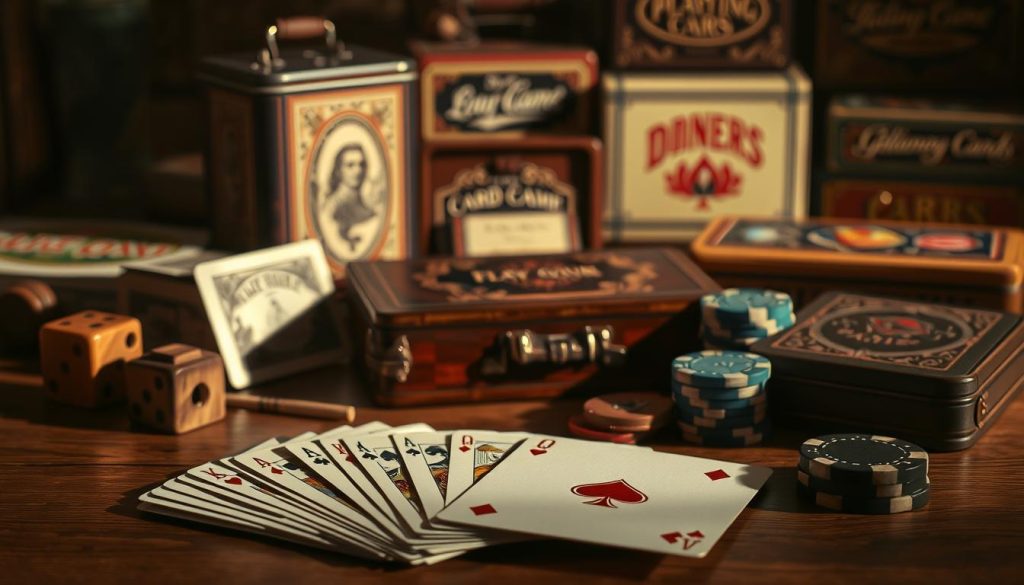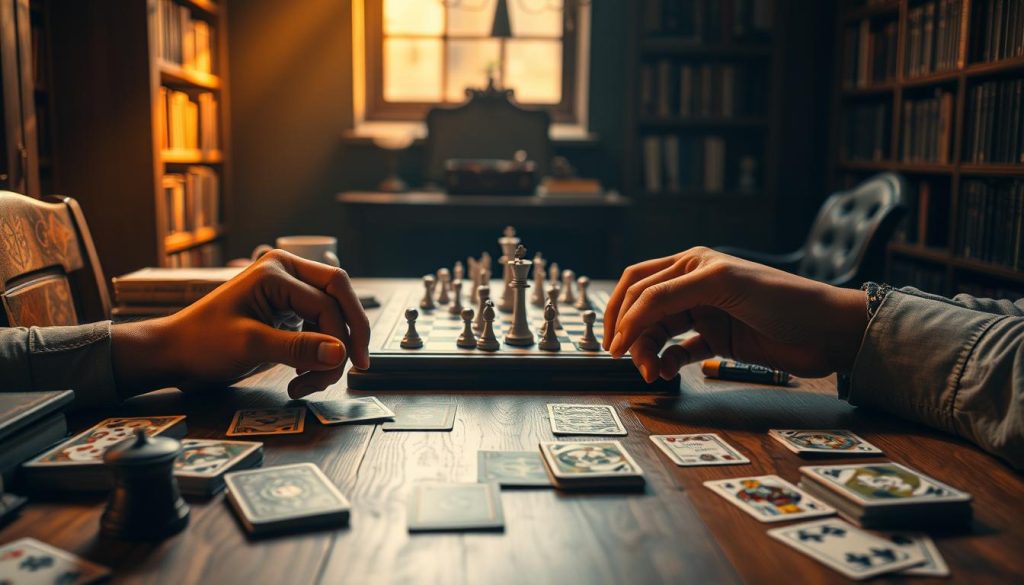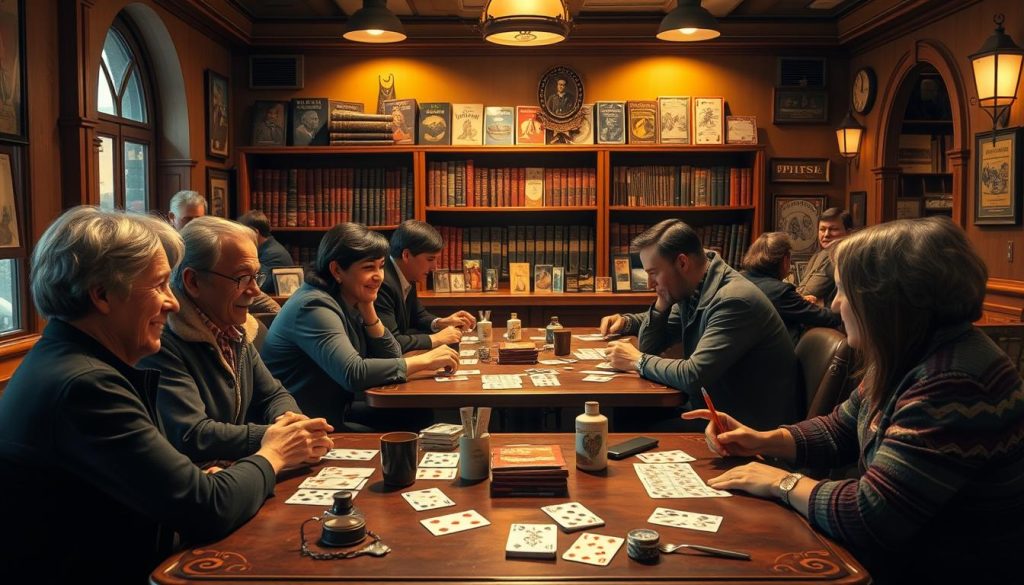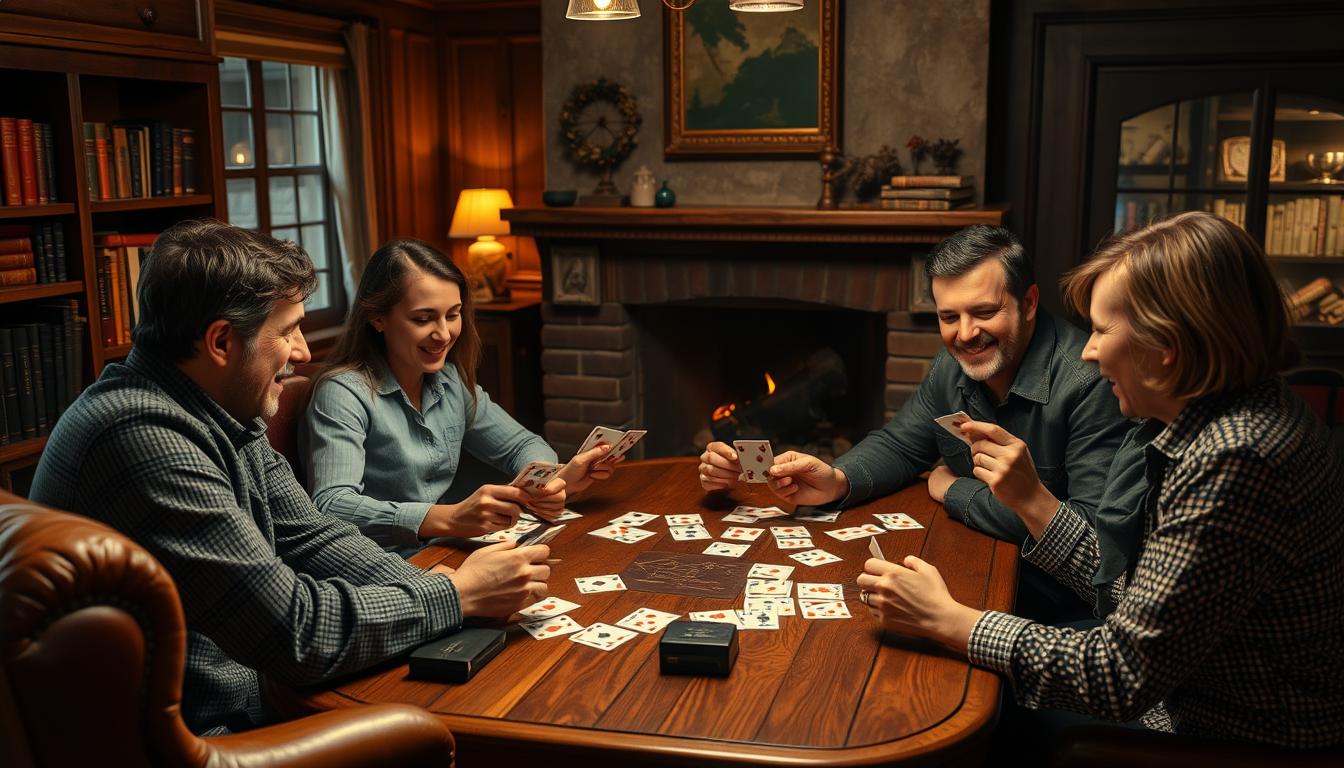Card games have been loved for many years. They mix fun and social time together. Classic card games are a great way to get away from screens and enjoy time with others.
Card games are enjoyed everywhere, from homes to community centers. They bring people together and make moments to remember. They also add joy through friendly games and shared fun.
Classic card games are fun for everyone, no matter if you’re new or experienced. They need little setup, are easy to learn, and offer hours of fun. They’re great for all ages and skill levels.
Explore the timeless charm of card games. They’re not just fun but also help improve thinking and communication. They also create special memories with family and friends.
The Timeless Appeal of Classic Card Games
Card games have been a big part of our social lives for a long time. They have traveled across the world, touching many cultures and families. This has made card games a beloved form of fun for people everywhere.
The story of playing cards starts with ancient civilizations. Each culture made these games their own, adding something special. From China’s early games to Europe’s royal card battles, cards have changed many lives.
Historical Evolution of Playing Cards
- Originated in China during the Tang Dynasty (618-907 AD)
- Spread through trade routes to Persia and Arab regions
- Introduced to Europe in the 14th century
- Adapted and transformed by different cultural traditions
Cultural Impact Through Generations
Card games have done more than just entertain. They helped people talk and connect across ages. Families and friends would play, learning and laughing together.
Social Bonding Through Card Play
Card games bring people together, no matter their background. Whether it’s poker, bridge, or Go Fish, they offer a chance for fun and connection. These games help us make memories and laugh together.
- Promotes social interaction
- Teaches strategic thinking
- Provides entertainment for all ages
- Builds communication skills
Essential Card Game Equipment and Setup

Getting ready for a great card game night means having the right stuff. Every card lover knows that top-notch playing card decks are key. The right deck can turn a game into a fun memory or a bad experience.
When you’re setting up your card game kit, don’t forget these must-haves:
- Standard 52-card decks (get a few sets)
- Card shuffling tray or a big flat area
- Card holders for easy play
- Score sheets and pencils
- Optional special decks for different games
Buying quality playing card decks is important for smooth play and lasting cards. Professional cards have better material, clear prints, and last longer. Cards with plastic coating last even longer and are easier to hold during games.
Setting up your game area is important for fun. Pick a bright, comfy spot with a smooth table. Make sure each player has room to sort cards and move around. Good lighting helps avoid eye strain and makes reading cards easier.
Keeping your cards in good shape is important. Store them in cool, dry places away from sunlight and water. Use card clips or rubber bands to keep them tidy when not playing.
Popular Classic Card Games for Beginners
Exploring card games is fun for all ages. Beginner card games are a great way to start. They’re perfect for family game nights and casual get-togethers.
Solitaire: The Solo Adventure
Solitaire is the top solo card game for beginners. It’s great for playing alone. The goal is to arrange cards in sequences, improving your strategy and problem-solving.
- Requires only a standard deck of cards
- Helps develop patience and critical thinking
- Multiple variations to keep the game interesting
Go Fish: Family Friendly Fun
Go Fish is a hit with families and young players. It’s simple yet fun. Players ask for specific cards, making it interactive and exciting.
- Easy to learn for children ages 4 and up
- Promotes social interaction
- Helps develop memory skills
Crazy Eights: Easy to Learn
Crazy Eights is fast-paced and fun for beginners. Its simple rules make it easy for all players. Players aim to get rid of all their cards by matching numbers or suits.
- Quick gameplay lasting 15-30 minutes
- Suitable for 2-7 players
- Requires minimal strategy for beginners
These classic card games are a great start for anyone. They have simple rules and fun gameplay, making them enjoyable for everyone.
Strategic Thinking in Card Games

Card game strategy turns simple play into a brain challenge. It’s not just about luck; it’s about using your brain and making smart choices. Players who get good at thinking strategically can play better and have more fun.
To win at card games, you need to know a few things:
- Understanding hand probabilities
- Anticipating opponent moves
- Managing risk effectively
- Maintaining emotional control
Good players can read small signs and make smart moves. It’s not about knowing lots of rules. It’s about being quick to change your plan when the game changes.
Getting better takes practice. Start by watching how you play and learning from each game. Experienced players say:
- Watch how skilled players play
- Learn about the game’s mechanics
- Play often
- Be patient while you learn
Remember, getting better at card games is a long journey. Every game is a chance to get better and learn new strategies.
Mastering Classic Card Games for Skill Development
Card games are more than fun. They help improve your brain. Playing them can make your mind sharper.
Card games are like a workout for your brain. They make you think ahead and stay focused. You need to be quick and strategic.
Memory Enhancement Benefits
Card games are great for your memory. You have to remember:
- Card sequences
- Opponent’s played cards
- Potential game strategies
Playing cards often can boost your memory. It keeps your brain sharp and ready.
Pattern Recognition Skills
Classic card games help you spot patterns. This makes you better at noticing things. You become more observant and analytical.
Mathematical Thinking
Card games require quick math. You learn to:
- Estimate probabilities
- Calculate potential point scores
- Make strategic numerical decisions
These skills help you solve problems better. Card games are a fun way to get smarter.
Social Benefits of Playing Card Games

Card games are great for making friends and keeping relationships strong. They bring people together, no matter their age or background. Everyone can enjoy them and share fun moments.
Playing cards is more than just fun. It helps people connect through games and teamwork. This builds important social skills and makes time together more enjoyable.
- Enhance communication skills through interactive gameplay
- Build stronger family and friend relationships
- Create opportunities for intergenerational bonding
- Develop teamwork and strategic thinking
Playing cards helps people get better at talking to others. They learn to be good sports and compete fairly. It’s a way to grow personally while having fun.
Local card game groups are places where people can find new friends. They are in community centers and online. Everyone can find others who love playing cards.
Card games are perfect for any group. They help us connect with others in a world that’s getting more digital.
Advanced Techniques for Card Game Success
Getting better at card games is not just about luck. Professional players know that using advanced techniques can make a big difference. They learn more than just the basic rules. They dive into complex strategies that take their game to the next level.
For serious card game fans, winning is about more than just luck. Learning advanced strategies can really help you stand out. It’s all about being better in different game situations.
Card Counting Basics
Card counting is a top strategy for players looking to get ahead. It’s about keeping track of cards to guess what’s left. The main ideas are:
- Stay focused during the game
- Watch for high and low cards
- Guess the chances of certain cards
- Be fast with math
Reading Opponent Behavior
Knowing what your opponents are thinking is key in card games. Good players spot tiny clues that show their plans. They watch for:
- Shaky movements
- Unusual betting
- Small facial expressions
- When they make decisions
Tournament Strategy Tips
Winning tournaments means using advanced techniques perfectly. Top players spend a lot of time getting ready. They practice, stay focused, and can change their plans when needed.
Online Platforms for Classic Card Games
Digital card game platforms have changed how we play classic card games. Now, you can play your favorite games from anywhere in the world. These platforms mix old-school card play with new tech, offering fun for all.
There are many digital card game experiences online. Some top sites add special features to make playing more fun:
- Instant matchmaking with global players
- Skill-based ranking systems
- Practice modes for learning new strategies
- Tournaments with real cash prizes
Games like Solitaire, Poker, and Gin Rummy are big hits online. Sites like GameColony, Poker Stars, and World of Card Games offer great places to play. They let you play with others worldwide, without limits.
Online card games are super convenient. You can play anytime, get better, and meet other fans. Whether you’re new or experienced, digital platforms make playing classic card games easy and fun.
Hosting Successful Card Game Nights
Planning a card game party needs careful thought and a warm welcome. Hosting game night can turn a simple evening into a fun social event. It’s all about making an atmosphere that’s fun, friendly, and memorable.
Planning the Perfect Setup
- Choose a comfy space with good lighting
- Make sure there’s enough seating for everyone
- Have many card decks and game supplies ready
- Set up a clear playing area with few distractions
Refreshment and Entertainment Ideas
Keep your guests happy and focused with the right snacks. Choose easy-to-eat finger foods. Set up a snack station with:
- Bite-sized appetizers
- Chips and dips
- Non-messy finger foods
- Many drink options
Managing Multiple Games
Good card game nights are flexible. Have several games ready to keep everyone entertained. Use a game rotation to let players try different games, keeping everyone excited.
- Prepare 3-4 different card games
- Let players vote on which games to play
- Set time limits for each game
- Keep track of scores for friendly competition
By following these tips, your card game party will be a huge success. It will create lasting memories and bring people together through fun games.
Modern Variations of Traditional Card Games
Card game fans are finding new ways to play old favorites. Modern card game variations have made classic games exciting again. They keep the original gameplay but add new twists to challenge players.
These new versions come in many types, making old games feel new. They add complexity and strategy to traditional card games.
- Digital adaptations that incorporate technology
- Themed versions with specialized decks
- Multi-player collaborative card game formats
- Strategic modern card games with expanded rule sets
Modern card games mix old favorites with new ideas. They add storytelling, role-playing, and complex strategies. This attracts both old and new players looking for fun.
The growth of card game variations shows players want more. From apps to custom decks, modern games offer new experiences. They keep the fun of traditional games alive.
Tips for Teaching Classic Card Games to Children
Teaching kids’ card games can be fun and educational. Start with simple games that are easy to learn and play fast. Solitaire, Go Fish, and Crazy Eights are great for young players.
Use colorful decks to make learning exciting. It’s like going on an adventure.
Being patient is important when teaching card games. Break down rules into simple steps. Show them how to play several times.
Make mistakes a chance to learn. Young kids learn best by doing and getting help from adults.
Make learning fun by turning rules into stories. Use pictures or simple tricks to help them remember. Praise them to make learning feel like a game.
As kids get better, introduce harder games. Play together often to improve their skills. Card games help with thinking, math, and making friends. Enjoy teaching this tradition to the next generation.

